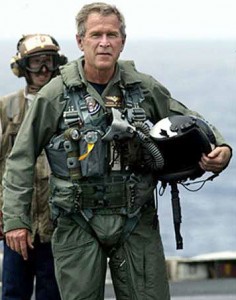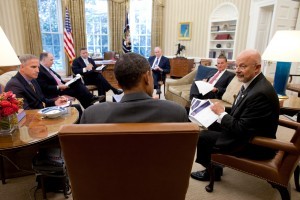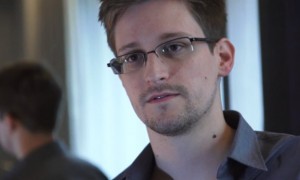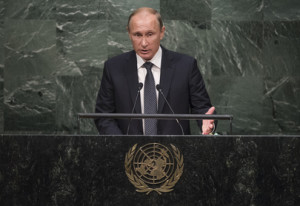The crème de la U.S. foreign policy establishment gathered in Texas last week, reaffirming at a friendly conclave the need for their skillful stewardship of the national security state, as Michael Brenner witnessed.
By Michael Brenner
The combined security/intelligence communities held a high-powered public conference at the University of Texas in Austin last week, a now regular event blessed by Chancellor (Admiral) William McRaven who previously had led OPERATIONS COMMAND (SOCOM).
The line-up of heavy hitters was impressive: Clapper, McLaughlin, Hadley, Breedlove, Zelikow, Negroponte, Eliot Cohen, General Norton Schwartz (former Chief of staff, Air Force), Joshua Bolten (Bush Chief of Staff), John Helgerson (CIA Inspector General), Kurt Campbell. Its purpose, though, remains obscure.

A scene from “Dr. Strangelove,” in which the bomber pilot (played by actor Slim Pickens) rides a nuclear bomb to its target in the Soviet Union.
Outreach to the American public is one standard explanation for this type of shindig. Communication in this instance, though, was one-way. The panels included only true believers in a hard-line, aggressive approach to a very long security agenda. The speakers’ roster was similarly stacked. Token participants from outside the “community” who had figured in previous meetings were nowhere in sight. So what the public gets is instruction rather than exchange or communication.
The choice of Texas is particularly odd since there are few locals who need conversion. At last year’s event, CIA Director John Brennan’s litany of grievances against all those who, like the Senate Intelligence Committee, were trying to rein in the CIA, NSA, et al elicited a standing ovation from the entire audience (minus one).
The level of enthusiasm was what one might expect had he announced the decimation of the last Comanche band or a State Supreme Court’s decision to void all land grants to Mexicans from the King of Spain. In 2015, Russia, Iran, Syria, the Islamic State and – not least- domestic enemies provided the amphetamine-like rush. Same this year. So what we had was the College of Cardinals trekking 1,200 miles to preach to the choir of a provincial town.
This effusive welcome is not surprising. After all, Texas is where the Governor (Greg Abbott) called out the State Guard to defend the citizenry from the threat of abuse by U.S. Army units engaged in a training exercise in one county north of Austin. He voiced sympathy for their claimed fears about possible rapine, robbery, wreckage, and – above all – confiscation of their firearms. So did almost all other elected officials.
In other words, the event had elements of an Evangelical rally – the crowd leaned toward the elderly, albeit with a considerable sprinkling of the college-aged and Generation “Xs.” Still, it was illuminating to hear the Word straight from the apostles. Understandably, in those congenial conditions restraint or ellipse are dispensed with in outbursts of self-satisfied candor.
Perhaps a better metaphor is a gathering of senior prelates at Rome’s Society of Jesus sometime in the early Seventeenth Century. For America’s foreign policy Establishment has a “near enemy” and a “far enemy.” The former includes those forces who would curb the robust exertion of power at home and abroad – either through misguided legal constraints or a scaling back of its audacious goals.
The aroused opposition to draconian surveillance and associated illegalities had been a threat to the Establishment’s authority and legitimacy. Now, that abortive Reformation has been quelled and the status quo ante restored with trivial concessions to the heretics. The outgoing Pope had seen the necessity and virtue of aligning with the Society and the Pope-designate is a proven sister-in-Christ.
Prioritizing Enemies
The “near enemy” is the priority, of course. For it poses a manifest or latent threat to the essence of the Establishment: its bureaucratic control, its lavish financing, its political clout and – above all – its position as cynosure of the creed, defender of the Faith from heresy, and spiritual guide to the nation in pursuing its external relations.
The “far enemy” is the world “out there.” That space can be divided into four categories: those places where conversion is complete and governments can be expected to bow to American suzerainty: Western Europe, Japan, etc.; other places where active proselytization is well underway: Eastern Europe, South Asia; places occupied by hostile forces which threaten directly or otherwise endanger the Establishment’s supremacy or general well-being; and, finally, those ambiguous zones where threats potentially could spawn.
Category III is where the “Evil One” resides – in his many manifestations: e.g. Russia, Iran, North Korea, Islamic terrorists. The “Evil One” is omnipresent – even when not visible as was the case in Austin.
Category IV embraces two concerns: a) nests where minor vipers may lurk – Latin American “reformers,” African gangster cabals, Mexican drug cartels – but not Afghan ones; and b) China. This last bulks large and ominously in the anxious imagination of the Establishment. It is the equivalent of nascent Islam to Christian Europe of the Dark Ages or – perhaps more closely – the Ottomans to Renaissance Europe.
What to do – confront, co-opt, co-exist, engage tactically? The Establishment’s movers-and-shakers instinctively lean toward confrontation. Their practical sense leans them toward vigilant accommodation. They fret but they don’t think creatively.
The blunt truth is that China scares the American foreign policy elite. It is too big, too successful, too self-confident, too ready to make claims of exceptionalism that supposedly are an American exclusive. That is why these Establishment apostles compulsively deploy the classic avoidance devices of disparaging it, of magnifying its problems, of persuading themselves that the United States’ position as king of the hill is impregnable. In other words, adolescent wishful thinking.
The “near enemy” front and the “far enemy” front intersect. They are mutually dependent. High-threat assessments on the latter are assets in campaigning for maximum support on the former. Expanded assets, material and political, in turn permit for more extensive engagement abroad. A veritable perpetual motion machine.
There does indeed exist a terrorism industry whose behavior largely conforms to that of other industries. It admittedly has a number of distinctive features. It is a public/private partnership; therefore it deals in two currencies – political rewards and money. Its activities have deep and pervasive support among the populace at large and elites. It is impervious to criticism since its functions are deemed critical to the nation’s basic security. Critics are either shrugged off or accused of not taking seriously grave threats.
The terrorism industry’s value to the country is impossible to measure since its success is defined in terms of negatives (things that haven’t happened) rather than positives (things that did happen). While tangible benefits are immeasurable, there are millions of people whose livelihood, status, self-esteem and political future depend on perpetuation of the terrorism industry as it currently is structured and operates.
In addition, the terrorism industry is both seller and buyer of its products – all of which are in the form of services. Its for-profit and non-profit components both depend on a high level of demand. Fear of terrorism generates the demand. Stoking fear generates higher returns for all those who work in the industry.
The same people in the non-profit sector who benefit also make the judgments, launch the policies and control the discourse as to how great the need is. A critique of assertions about the magnitude, nature and change in the level of threat we face must be understood against this backdrop. So, too, must any assessment of how well present policies and practices are working.
Remarkable Conclave
The Austin conclave was remarkable in two respects: its calm self-confidence; and its unquestioning belief that the American Establishment has a Providential mission to oversee the affairs of the globe. Truth is immanent (or inherent) in U.S. foreign policy. America’s motives pure. Its means measured.

President George W. Bush in a flight suit after landing on the USS Abraham Lincoln to give his “Mission Accomplished” speech about the Iraq War.
The paramount responsibility of those who lead is to scour the world to find and identify threats – and then to devise strategies for eliminating them. Periodically, they must also ensure that the American people fully understand why and what is being done on their behalf.
When it comes to policy advocacy, the two recurrent words are “should” and “must” – as in New York Times editorials. “We should strengthen our military presence in Syria to counter Russian influence.” “Putin must stop his aggression in the Baltics and Balkans” – Stephen Hadley, national security adviser to President George W. Bush. (Geography evidently is not this crowd’s strong suit).
Embedded in this rhetoric is a pair of core propositions. Like pillars of the Faith, they do not require explicit restatement. The overriding purpose of American foreign policy is to achieve absolute security for the United States. In the long run, that means Americanizing the world. In the shorter term, that means strenuous, unrelenting efforts to smite our enemies and to preempt potential threats.
There are four guiding principles:
—It is legitimate, even imperative, for the threatened democratic world, led by Washington, to use its power to forestall assaults on them.
–Traditional concepts of state sovereignty do not constitute an acceptable legal or political barrier to efforts at imposing that solution.
–The United States, therefore, is not a “global Leviathan” that advances its selfish interests at the expense of others. It is, rather, the benign producer of public goods.
–The privilege of partial exception from the international norms, including the right to act unilaterally, is earned by an historical record of selfless performance.
Don’t Look Back
The worthies on the Austin panel spent no time on a retrospective critique of the policies and action that have flowed from this world-view. The objective record may show that the country has invested enormously in serial failure relieved only by the modest success of dispersing Classic Al Qaeda and dislodging the Taliban – temporarily.

Director of National Intelligence James Clapper (right) talks with President Barack Obama in the Oval Office, with John Brennan and other national security aides present. (Photo credit: Office of Director of National Intelligence)
The global struggle goes on against enemies real and imagined without any appreciable change in strategic thinking. Its sole convincing victory has been mastery of the American public mind. Yet, there is no reappraisal of core premises. The tragic Iraq fiasco got one mention: “we need to better identify what factors in the equation we have inadequate Intelligence about, like WMDs” –Director of National Intelligence James Clapper.
The resilience of Faith in strategic doctrine as some sort of Holy Writ is evident in the Establishment’s approach to Syria. Speakers evinced an undifferentiated and unqualified consensus on America purposes there. American priorities emerged clearly. In this mess, we still can discern what they are – and that there exists a consensus on their importance and ordering. As noted in an earlier post:
- The paramount objective is to thwart Russia’s efforts to exercise influence and to establish its position in Syria.
- Get rid of Assad. We have committed ourselves to the Israelis, the Turks, and the Saudis on this. Their wish is our command.
- Marginalize and weaken Iran by breaking the Shi’ite Crescent
- Wear down and slowly fragment ISIS. Success on this score can cover failure on all others in domestic opinion.
- Ensure a permanent American physical presence in Iraq, i.e. achieve what we failed to achieve in 2008.
- Facilitate a de facto partition of Iraq with bits of Syria attached to the Iraqi bits. Hold this out as the lure for the Kurds to act as our infantry.
- Facilitate some kind of Sunni entity in Anbar and eastern Syria. How can we prevent it being destabilized by attacks from ISIS remnants? How can we prevent it falling under the sway of Al Qaeda? Good subjects for the Obama Foundation’s first major study project.
- Al-Nusra in Syria proper? Hope that the Turks can “domestic” al-Nusra. Incentive? Obscure. No one made mention of Washington’s tacit alliance with Al Qaeda in Syria. No one made mention of pressuring Turkey and the KSA to cease and desist supporting jihadi elements, no mention was made of Israel, no mention was made of post-Assad Syria.
The words “should” or “must” in regard to other parties were absent from all discussion of Syria. Indeed, Hadley and others urged that we redouble efforts to repair credibility in the eyes of Riyadh and Ankara. These Establishment figures have spent so much time in blind alleys that they seem unable to tell night from day.
Every Soul is captive
Of its own Deeds — Qur’an 74:38
The U.S. foreign policy Establishment is not big on introspection or self-reflection – it sparks fear of an acute agoraphobia attack.
Michael Brenner is a professor of international affairs at the University of Pittsburgh. mbren@pitt.edu



This is bloody madness. The establishment has doubled down on the conservative Sunni alliance that brought us 9/11. How on earth can they decide that this time that wont happen. How many 100 000 will be massacred in Syria as it is turned into a Wahhabi compliant state? Does one really think that such a state will seek peace with Israel?
Nuts.
israel seeks peace with no arab or persian nation. just “arrangements”.
In the words of Monty Python, these people are,”Too mentally unstable even for national defense.”
” Its sole convincing victory has been mastery of the American public mind.”
How very true, and if the American public don’t wake up soon, we are all going to hell.
I’m not quite sure if thanking Michael Brenner is appropriate here or not because his excellent take down of “the heart of darkness” is painful to read. I’m reading Joan Mellen’s “Faustian Bargains” about the LBJ/Mac Wallace relationship in Texas where much of our contemporary problems began on or before 11/22/1963. The College of Cardinals, that’s a good one Professor. Thanks…
https://www.amazon.com/Faustian-Bargains-Johnson-Wallace-Culture/dp/1620408066/ref=tmm_hrd_swatch_0?_encoding=UTF8&qid=&sr=
This is a brilliant piece. They delude themselves–and the American public–to justify their wealth and power.
The reality these psychopaths don’t want to face – but eventually will have to, is a coordinated strategy to force the evil empire into a three front war. Here’s how it could possibly work: Iran mines the Straight of Hormuz, China moves against Taiwan, and Russia decides the missiles in Poland and Romania are a pill too big to swallow. In 48 hours, any delusion that imperial hegemony or military superiority is anything but a manifestation of psychotic dimentia becomes irrefutable. An aircraft carrier or two would probably be sunken right off the bat…just to let reality sink in that our entire “air-land-sea” doctrine is an infantile fantasy. Every imperial pipe dream eventually succumbs to a multi-front war or economic over-reach. We are engaged in both. Duck and cover!
President Trump will fire them all.
Oddly enough today it crossed by mine, how I haven’t seen any essays from Professor Michael Brenner on consortiumnews for a while, and then there ya go…he’s here.
Wouldn’t it have been great if the big meeting in Austin were about worldwide disarmament? The Project for the New American Century is an expansion strategy for global dominance, and to do this all while America still has the number one military to do it with. Although, this strategy is a good one because America does have the military might, I would argue to flip that train of thought, and use our military superiority to leverage a plan for global disarmament. America having the most of almost everything would be in a comfortable position to persuade others to start scaling down on theirs and ours nuclear and conventional weapons. In fact that’s the kind of military power Reagan spoke about at the 64 Republican Convention. Our strong military would ensure peace, was the idea. So maybe this would be a good subject for the next meeting. That is of course if we don’t blow ourselves up along the way before that next meeting happens.
Except, Joe, our military is part of the military-industrial complex. If the military were to push for disarmament and peace the industrial complex would go out of business.
Yeah I know. Idea; start working on bomb removal, and then work on climate change….make your own honey do list, but we could keep people working if we had better priorities.
Let’s go to Mars! We could have made 2 round trips there with the money we spent just on Iraq. Imagine what else we could have done if we worked with the Russians and not against them.
Something from The Good Old Days.
Duck And Cover (1951) Bert The Turtle
If the neocons have their way, this may be useful information. Just to be on the safe side, after you’ve put your hands behind your head and pulled your head down between your legs, it might be prudent to go ahead and kiss your sweet *** goodbye.
Zachary for me that movie brought back old memories. My son our youngest who is thirty watched it with me, and couldn’t get over how ridiculous it was. I remember my dad telling me, if the day ever comes they decide to drop the bomb, to run outside in the middle of the street open up my arms and say, sweet Jesus please take me I’m yours. BTW I’m reading articles where they say Obama has told Kerry to throw down the gauntlet on Russia, and that we may resort to using military options against Russia in Syria, if Russia doesn’t quit bombing Aleppo. We all may need to watch the Duck & Cover movie, or not!
The neocons are really beginning to crank it up in Syria. Obama & Co. have threatened to flood that nation with MANPADS, and have continued their drive to carve out a chunk of Syria for the Kurds so as to implement the Yinon plan for Israel. You know, break Syria into pieces so as to guarantee continued chaos.
It may or may not be relevant that Obama is in Israel to pretend to grieve for one of their dead war criminals, but the US military – with or without his authorization – has bombed two important bridges in Eastern Syria.
http://www.reuters.com/article/us-mideast-crisis-syria-usa-bridges-idUSKCN11Z2PK?il=0
The blogger at the Minstrel Boy site explains what’s going on.
This entire business gets more and more serious with every passing day.
hXXp://minstrelboy.blogspot.com/2016/09/us-led-coalition-destroys-two-bridges.html
Here is another link explaining what is happening in Syria:
http://www.informationclearinghouse.info/article45576.htm
The U.S. bombs a Syrian military enclave killing over 89 Syrian soldiers. Then Russia targets an Intelligence Operations Center killing 30 intelligence officers from the US, Britain, Israel, Turkey, Saudi Arabia and Qatar:
http://www.globalresearch.ca/u-s-coalition-intelligence-operations-room-inside-syria-destroyed-by-russian-missile-attack-thirty-israeli-american-british-turkish-saudi-qatari-intelligence-officials-killed-report/5547099
Samantha Power walks out on secret UN Security Council meeting and now Kerry is threatening to stop all communications with Lavrov.
And now the US is taking out bridges used by the Syrian troops and Russia?
Looks like WW III has started.
Just in time to elect Her Royal Highness.
Sickening times.
You are the only one who has it right. “Eretz Israel” and “Oded Yinon” is a monstrous inhuman plan.
But people are starting to find out the truth.
Keep spreading the word.
The panels included only true believers in a hard-line, aggressive approach to a very long security agenda.
In other words, another version of America’s congenital proclivity for aggression against “the other.” First it was the slave trade, then ethnic cleansing of Native Americans, and a long list of “others” subject to the disdain and inhumanity of the prevailing Establishment.
Texas is where the Governor (Greg Abbott) called out the State Guard …
Ahh, Texas. If only former governor Rick Perry had followed through on his plan to secede from the United States.
The blunt truth is that China scares the American foreign policy elite.
This appears to be a sign these “elites” have not gone totally bonkers. I recall a cartoon many years ago before Corporate America shipped most of its manufacturing work to China. There was a drawing of Chairman Mao doing some calculations along the line of so many billions of Chinese less so many billions lost in a war with the US, but we would still have billions of Chinese survivors. In such a presumed nuclear war if the United States “only” lost 350 millions Americans, the US would be down to zero.
In the meantime, a bunch of Taliban fighters have the US and its NATO sidekicks trapped in a quagmire.
The UT Austin conference was titled, “Security in Transition: National Security Challenges Facing the Next President”
The first day’s session on Europe and Russia featured Philip Breedlove, former Commander of U.S. European Command and former Supreme Allied Commander Europe (SACEUR), who perpetually hallucinates a “Russian invasion”.
Breedlove was back on the second day at the LBJ Presidential Library, a remarkably fitting venue, to bloviate about the Pentagon’s view of the President’s Role as Commander in Chief.
As recently revealed by the website DC Leaks and highlighted by the Intercept, Breedlove is an expert on this topic:
“Retired U.S. Air Force Gen. Philip Breedlove, until recently the supreme commander of NATO forces in Europe, plotted in private to overcome President Barack Obama’s reluctance to escalate military tensions with Russia over the war in Ukraine in 2014”
Hacked Emails Reveal NATO General Plotting Against Obama on Russia Policy
By Lee Fang, Zaid Jilani
https://theintercept.com/2016/07/01/nato-general-emails/
“General Breedlove”? Dr. Strangelove, more like. You know DR. STRANGELOVE, the documentary.
General Jack Ripper: “War is too important to be left to the politicians.”
Frankly, it isn’t worth your time, Mr. Brenner, in chronicling what these folks say or do. They’re neo-con extremists found in the US military/State Dept. Complex. They’re hell bent on destroying Syria, Russia, Iran and then China.
Not even Adolph Hitler was as crazy as these “cockroaches.” Don’t spend another minute on them. They all need to be thrown overboard in the dark, and brooding Atlantic Ocean.
And what exactly are you suggesting to get that done?!
Human beings aren’t acting alone, upon the World Stage. The Gods intervene (or Ministering Angels, if one prefers). The Davids slay the Goliaths with regularity, throughout history. It matters not, whether one believes this or not.
I believe Coyote Trickster will be having a hand in events, in the near future. I saw one standing on the side of the highway while driving to work, staring at me as I looked at Him…quite unusual. I wouldn’t care to make a prediction; not while Coyote is in play.
If only!